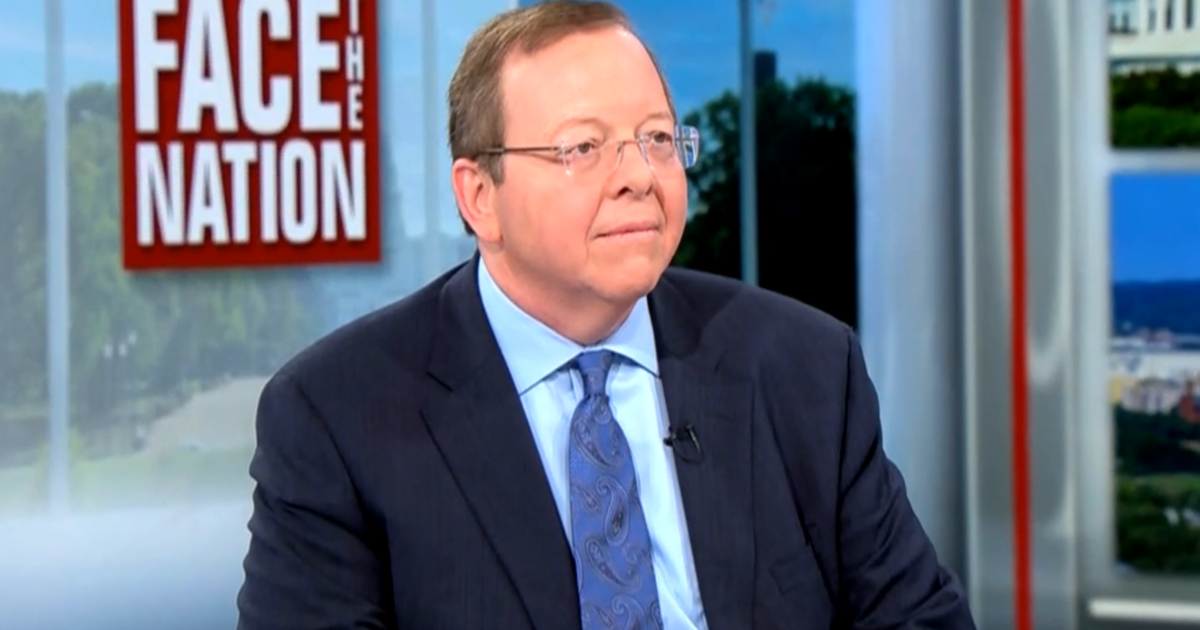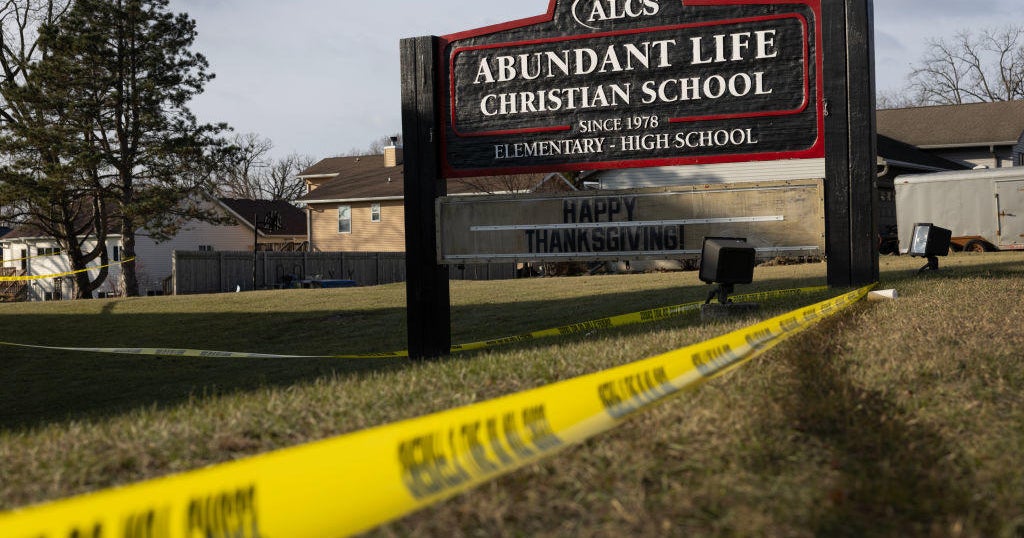CBS News
Transcript: University of Chicago professor Robert Pape on “Face the Nation,” April 28, 2024

The following is a transcript of an interview with University of Chicago professor Robert Paper that aired on April 28, 2024.
MARGARET BRENNAN: And we’re joined now by the founding director of the Chicago Project on Security and Threats, University of Chicago Professor Robert Pape, who has new findings on the college protests over the Israel-Hamas war. Welcome back to the program. I understand you’ve been surveying about 5,000 students, 600 colleges and universities, between December and January. Because this stretches back to right after October 7. What did you learn about what’s happening?
ROBERT PAPE: The big thing we learned is that the feelings of fear on college campuses are more widespread and more intense than we have known. Overall, 56% of Jewish students report feeling in personal danger. Close behind, 52% of Muslim students report feeling in personal danger. And 16% of all students who are not Jewish and not Muslim, this is two to three million college students, also report feeling in personal danger. We also ask them in textboxes, why, and over 1,000 students told us why. And what they’re reporting, Margaret, is not TikTok. What they are reporting is, observing acts of physical violence and intimidation right in front of them. Jewish students are seeing Jewish buildings attacked. Muslim students are seeing people counter back- counter attack against Muslims. The students that are not Jewish and not Muslim, they’re just seeing everybody getting, you know, attacked. Also, protest chants are playing a role. So what we’re seeing in general is that this is not fading away. This is a direct function of the escalation in the Middle Eastern conflict over there. And this is having spillover effects on our campuses, and of course, in some cities.
MARGARET BRENNAN: Well, the Speaker of the House, Mike Johnson, went up to Columbia University this week. You had four Democratic lawmakers, all Jewish, who went, they said in solidarity with Jewish students there, and threatened to withhold federal funding. Is that kind of political involvement helpful, or is it putting fuel on the fire?
ROBERT PAPE: It is putting fuel on the fire, because it’s so one-sided. If Speaker Johnson had gone together with Hakeem Jeffries with an actual plan to bring calm, and we’ll talk about what that might look like, then this is a different story. But by come- making it a surprise, by making threats, you know, if you don’t do X, we will fire Y and we’re going to do X, and this is all a surprise, this is actually not helpful for crowd control at all. So, I also study the actual violent part of this. And the number one thing when you have protests that are building, is don’t do a surprise. In Portland during the George Floyd protests, you might remember DHS surprised Portland, that escalated things. This is a very bad idea. So you need to have a more thoughtful approach to calming tensions that go beyond crowd control, and that are not simply, one side is right, everybody else is wrong. And we’re going to hammer it through until we win.
MARGARET BRENNAN: So who was that first line of action coming from? Is it university presidents? Or are you talking about law enforcement?
ROBERT PAPE: There are roles here for university presidents, law enforcement and national leaders, and actually, talking to law enforcement here directly, in- folks who do this in Chicago, law enforcement is actually much more sophisticated, I think, than you might see from the national here. So that’s why I think it’s so important to focus on the solutions from the perspective of our university leaders, our national leaders, because they are only episodically involved with dealing with violence and political violence. And that’s really why it’s so important to focus on what our university leaders should be doing and our national leaders, beyond simply crowd control.
MARGARET BRENNAN: It sounds like you’re saying, people have forgotten how to have a civil conversation about a heated issue.
ROBERT PAPE: Well, they–
MARGARET BRENNAN: Isn’t that what university is supposed to be about?
ROBERT PAPE: They- they are, but no- October 7, caught all of us by surprise, and it caught universities by surprise. So we are simply- we have policies, we have policies of the Kalven Report at the University of Chicago. These were many of the campus policies and our practices developed in the 1960s. And almost no leader who’s running either our government or university was involved in the 1960s. And the issues we’re dealing with today are new. They’re not completely new, but I would say, like, 90 degrees new, and that is what we have to come to grips with. And not just assume everything was fine before so they will just fade away and they will be fine again.
MARGARET BRENNAN: There’s a lot of focus on the physical protest right now. But going back to October, you had those three Palestinian boys shot in Burlington, Vermont. You had congressional hearings, grilling college, university leaders for not reining in language used on campus. I mean, this has been going on for six months now. Does it stop when the school year ends?
ROBERT PAPE: I don’t think we can count on that for several reasons. Number one, we have graduation season to get through. Number two, many of our colleges now have summer programs that are quite extensive. So for many colleges and universities, things don’t completely come to a halt during the summer, but also next fall. Fall is all- not that far away. And this could also happen again, it could happen in- in the middle of our election season as well. So there are many, many reasons. The Chicago convention. There are many reasons why we should take calming steps now. And again, not just keep assuming, oh, yeah, everything’s fine. We just need to get through the next day or two, or the next week or two, and then things will just fade away. I think that was an assumption by many quite important and credible leaders, that assumption now needs to be pushed aside.
MARGARET BRENNAN: Professor, thank you for your insights. We’ll be back in a moment.
CBS News
12/18: The Daily Report – CBS News

Watch CBS News
Be the first to know
Get browser notifications for breaking news, live events, and exclusive reporting.
CBS News
Teacher, student killed in Wisconsin school shooting identified

A teacher and student killed in a shooting earlier this week at a school in Madison, Wisconsin, were identified Wednesday by authorities.
The Dane County Medical Examiner’s Office said in a news release provided to CBS News that 42-year-old Erin West and 14-year-old Rubi Vergara were fatally shot Monday morning at Abundant Life Christian School.
Preliminary examinations determined the two died of “homicidal firearm related trauma.” Both were pronounced dead at the scene, the medical examiner said.
An online obituary on a local funeral site stated Vergara was a freshman who leaves behind her parents, one brother, and a large extended family. It described her as “an avid reader” who “loved art, singing and playing keyboard in the family worship band.”
West’s exact position with the school was unclear.
The medical examiner also confirmed that a preliminary autopsy found that the suspected shooter, 15-year-old Natalie Rupnow — a student at the same school — was pronounced dead at a local hospital Monday of “firearm related trauma.” Madison Chief of Police Shon F. Barnes had previously told reporters that Rupnow was pronounced dead while being transported to a hospital.
Police had also previously stated that she was believed to have died from a self-inflicted gunshot wound.
The shooting at the private Christian K-12 school was reported just before 11 a.m. Monday. In addition to the two people killed and the shooter, six others were wounded.
Police said the shooting occurred in a classroom where a study hall was taking place involving students from several grades.
A handgun was recovered after the shooting, Barnes said, but it was unclear where the gun came from or how many shots were fired. A law enforcement source said the weapon used in the shooting appears to have been a 9 mm pistol.
and
contributed to this report.
CBS News
Last-minute government funding bill in limbo after opposition from Trump, others

Watch CBS News
Be the first to know
Get browser notifications for breaking news, live events, and exclusive reporting.



